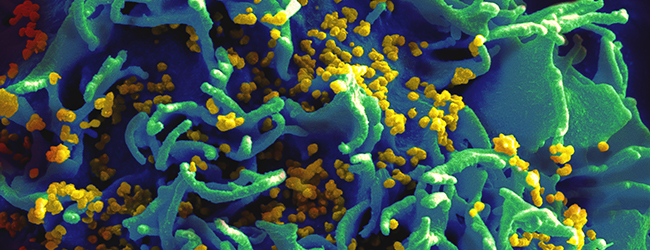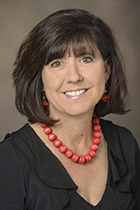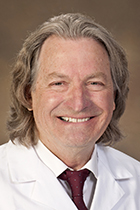The University of Colorado – Denver’s Dr. Elizabeth Connick is named to succeed Dr. Stephen Klotz as chief of the Division of Infectious Diseases, bringing a broad research portfolio on HIV and AIDS prevention to the University of Arizona College of Medicine – Tucson.

Scanning electron micrograph of HIV particles infecting a human T cell. [Source: NIAID via Wikimedia Commons]

Renowned human immunodeficiency virus (HIV) researcher Elizabeth Connick, MD, a professor of medicine at the University of Colorado – Denver, has been named chief of the Division of Infectious Diseases at the University of Arizona College of Medicine – Tucson. Dr. Connick will join the UA faculty in April.
“We’re very excited to have such an accomplished physician-scientist join us as a colleague and leader in such a critical medical subspecialty,” said Monica Kraft, MD, chair of the UA Department of Medicine and the Robert and Irene Flinn Endowed Professor of Medicine.
“Dr. Connick’s basic immunology studies and clinical trials into immune therapies to help us understand HIV and how to better prevent infection and AIDS, as well as her outreach work to promote improved awareness among younger generations via engagement programs, have been crucial to the struggle to limit the impact and find a cure for this devastating disease,” Dr. Kraft said.
“I’m fortunate to join a well-run division with excellent clinician-educators,” Dr. Connick said. “I look forward to working with Banner – University Medical Center leadership to further develop the infectious disease consultation services and other programs that enhance patient safety, such as antimicrobial stewardship. I also anticipate building a stronger research program in the division by recruiting more physician scientists and integrating a research component into the infectious disease fellowship.”
 Dr. Connick’s research, much of it funded by the National Institutes of Health (NIH), targets HIV immunopathogenesis — disease development involving an immune response or related component. She has been involved in clinical trials as well as laboratory-based translational research studies of HIV-1 infection for more than 20 years, including studies of acute HIV infection, immune reconstitution, cardiovascular disease and HIV pathogenesis among women. More recently, she has focused on strategies to develop a cure for HIV infection.
Dr. Connick’s research, much of it funded by the National Institutes of Health (NIH), targets HIV immunopathogenesis — disease development involving an immune response or related component. She has been involved in clinical trials as well as laboratory-based translational research studies of HIV-1 infection for more than 20 years, including studies of acute HIV infection, immune reconstitution, cardiovascular disease and HIV pathogenesis among women. More recently, she has focused on strategies to develop a cure for HIV infection.
“My specific expertise,” Dr. Connick said, “is in studies of HIV pathogenesis in lymphoid tissues, where the majority of HIV replication and CD4+ T cell destruction occurs. I currently have funding to investigate mechanisms underlying HIV’s evasion of cytotoxic T cell responses in lymphoid tissues, and am co-principal investigator of a study into the impact of exercise on endothelial cell dysfunction in HIV-infected individuals.”
She is principal investigator on three current NIH grants totaling nearly $4 million, including one with long-time collaborator Pamela Skinner, PhD, of the University of Minnesota. She also recently received nearly $3.3 million in NIH funding for another project for which she is co-principal investigator with Christopher DeSouza, PhD, of UC Boulder.
Throughout her career, Dr. Connick has received research funding totaling nearly $14.2 million as principal investigator, $43.5 million as co-investigator and $121.5 million in other roles.
Dr. Connick graduated from Harvard Medical School in 1988, then completed an internship and internal medicine residency at Columbia Presbyterian Medical Center in New York and an infectious disease fellowship at the University of Colorado. She currently is medical director at the UC Boulder Clinical and Translational Research Center and chair of the Radiopharmaceutical Oversight Committee, the Radioactive Drug Research Committee, and the Human Use Committee on Ionizing Radiation at UC Denver. She holds joint appointments as an adjunct professor in the UC Department of Integrative Physiology and the UC Department of Immunology and Microbiology. She also is an attending physician at the University of Colorado Hospital in Aurora, Colo.
Dr. Connick is a member of the Women’s Research Initiative on HIV/AIDS and the Women’s Interagency HIV Study External Advisory Board. She recently was appointed to the NIH Office of AIDS Research Advisory Council, and previously assisted in efforts to identify priorities for the Women and Girls component of the Trans-NIH Plan for HIV-Related Research (2008-12). She also served on the Antiviral Drug Advisory Committee (2011-14) of the U.S. Food and Drug Administration.
Since 1995, she has held multiple leadership roles with the AIDS Clinical Trials Group (ACTG), a large HIV clinical trials organizations that plays a significant role in standards of care for HIV infection and opportunistic diseases related to HIV and AIDS in the United States and developing world. Dr. Connick currently is vice chair of the ACTG Women’s Health Inter-Network Scientific Committee.
In 2014, she was named to the scientific advisory committee of amfAR, the American Foundation for AIDS Research, and in 2015 she became a Fellow of the Infectious Disease Society of America.
In addition, Dr. Connick serves on the editorial boards of the Infectious Disease News, Journal of Acquired Immune Deficiency Syndrome and Journal of the International AIDS Society, and as a reviewer for Lancet, Nature Communications and several other infectious disease-related journals.
The Division of Infectious Diseases is one of 13 divisions in the UA Department of Medicine, the largest department in the UA College of Medicine – Tucson with more than 100 faculty physicians and more than 100 resident and fellow physicians in training.
 Dr. Connick replaces Stephen A. Klotz, MD, who has led the division since 2008, first as interim chief when Eskild A. Petersen, MD, retired, and then as chief when he was appointed to the post in 2009. The Petersen Clinics at Banner – UMC Tucson, funded by a $1.5-million-a-year U.S. Health Resources and Services Administration (HRSA) grant to the UA under the federal Ryan White HIV/AIDS Program, are named for Dr. Petersen, who came to the UA in 1974.
Dr. Connick replaces Stephen A. Klotz, MD, who has led the division since 2008, first as interim chief when Eskild A. Petersen, MD, retired, and then as chief when he was appointed to the post in 2009. The Petersen Clinics at Banner – UMC Tucson, funded by a $1.5-million-a-year U.S. Health Resources and Services Administration (HRSA) grant to the UA under the federal Ryan White HIV/AIDS Program, are named for Dr. Petersen, who came to the UA in 1974.
Eager to pass on the reins to Dr. Connick so he can focus on his own research, Dr. Klotz said, “Oh, I’m tickled pink about her coming. She can’t get here fast enough. She’s going to join a division that’s one of the busiest and friendliest in this university. We teach on everything and have a huge clinical load as well.”
Dr. Klotz plans to stay on in the division, doing HIV clinics and in a research capacity. He noted work being done in his division into frailty and HIV, kissing bugs and Chagas disease, and binding of certain ameloid P components in fungi, such as those related to candidiasis which causes thrush and yeast infections, among others.
Coming from the University of Kansas, Dr. Klotz joined the UA faculty in 2000. Among roles he has held are fellowship program director, medical director of the Arizona AIDS Education and Training Center (AETC)(link is external), and principal investigator for the HRSA Ryan White Early Intervention Services Grant, which includes research and patient care in the Petersen Clinics at Banner – UMC Tucson. He’s proud that HIV care at the clinics was rated No. 3 in the nation last summer by the University HealthSystem Consortium. The clinics serve nearly 1,400 patients and employ 15 people, led by Program Director Shannon Smith.
The infectious diseases division also is home to AETC, funded by another HRSA grant and led by Program Director Alyssa Guido. AETC provides physicians, dentists, nurses, nurse practitioners, pharmacists and mental health workers with access to training from peer colleagues with expertise in the management and treatment of HIV disease.
The division also operates the Refugee Preventive Health Screening Program, led by Director Natasha Korosteleva and Hooshang Nematollahi, MSN, FNP.C, that provides initial health screenings for about 1,200 foreign refugees, largely from Africa and Asia, who relocate to Southern Arizona each year through the U.S. Health and Human Services Office of Refugee Resettlement and the Arizona Department of Health Services. The screening clinics often serve as the first encounter refugees have with Western medicine. Afterward, many continue with Banner – UMC for their health care.
Media Contact: David Mogollon
ALSO SEE:
“Moving Up in Southern Arizona: Infectious disease specialist Connick to lead UA division”(link is external) (Arizona Daily Star) | Posted Jan. 23, 2016

